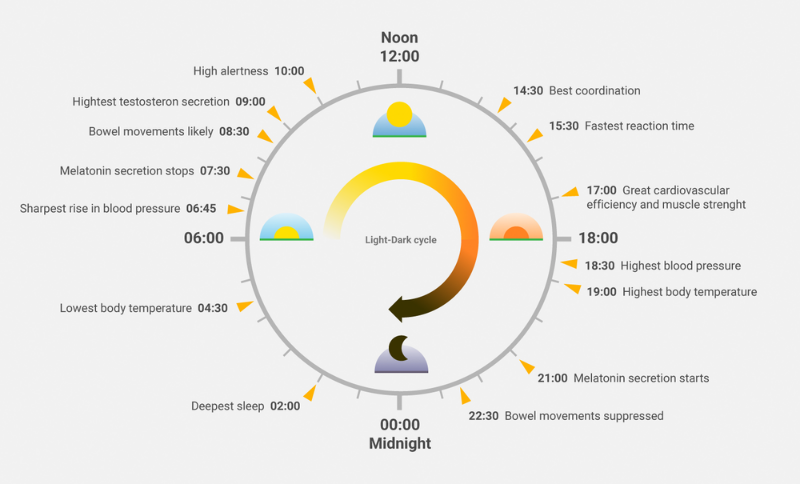The science behind weight gain is very complex. We now know that it’s not only about what we eat; when we eat matters too.
The latest research suggests that timing of food intake itself may play a significant role in weight gain. On top of controlling the amount of calories intake, the significance of timing of meal intake is also very critical when it comes to weight loss interventions.
Research suggests that time-restricted feeding regimen is a great non-pharmacological strategy against obesity and associated diseases.
Circadian rhythm - Our biological clock
Many studies suggest that meal timing is crucial, and it should be according to our circadian timing - our own biological clock.

Image sourced from here.
The circadian cycle is comprised of fluctuation in levels of various hormones that are produced in the day, evening and night and they govern various rhythmic biological processes in the human body. The master clock in the hypothalamus of the brain controls various clocks that are present throughout the body. These clocks should be properly synchronized with each other and to the environment, for the optimal functioning of the circadian system.
There is a definitive link present between nutrition, metabolism and circadian rhythms. Meal timings play a significant role in the synchronization of circadian rhythms in humans. It has been shown that a delay of a few hours in the three meals of a day can lead to marked changes in glucose concentration rhythms in plasma and mRNA rhythms in adipose tissues. Disruption of circadian rhythms have been found to result in metabolic disorders and poor health. Eating meals especially after 8 pm and near sleep hours is known to adversely affect the health and lead to an increase in the BMI (body mass index) and weight .
Role of Melatonin
When talking about circadian rhythm and sleep cycles, the hormone melatonin holds a special place. This hormone sees an increased production at night and decreases during daytime. Melatonin is considered as a sleep signal for your body. There is a relationship between high melatonin and high glucose concentration, and it is not a good one. Late night eating habits can lead to increased risk of Type II diabetes. As increased circulating level of melatonin and high glucose concentration leads to impairment of glucose tolerance.
Genes and Its Impact on Melatonin & Circadian Rhythm
MTNR1B is the melatonin receptor gene and is now recognized as a diabetes risk gene as it plays an important physiological role in the regulation of glucose level in the blood. Changing the habit of late meals into early meals have proven to be beneficial in controlling glucose tolerance especially in patients with MTNR1B risk allele.

This translates to lower risk of developing type 2 diabetes! An intricate knowledge of your body’s internal clock can be of a huge advantage when it comes to weight loss and metabolism of glucose in the body.
The circadian clock is present in almost all cell types and tissues of the body. By adopting a disciplined meal intake pattern based on your genetic risks, one can considerably decrease the risk of various metabolic disorders that affect the immune response, hormone release, digestive processes, lipid and glucose homeostasis.
The CLOCK gene (circadian Locomotor Output Cycles Kaput), that is one of the transcription factors of the molecular clock, is considered to play a central role in the metabolic alterations related to obesity. Individual with a specific allele (G) of CLOCK gene tend to loss weight with difficulty and are more prone to become obese.
A large body of research has demonstrated that disruption of the endogenous circadian clock, whether environmental or genetic, lead to metabolic dysfunctions that are associated with obesity, diabetes, and other metabolic disorders. This idea of restricting your eating habits with light can prove very beneficial in controlling weight and obesity. Cutting down habits of late dinners and midnight munching can be hard, but it makes for a very effective weight-loss strategy, and can make us more energetic and less prone to diseases.




